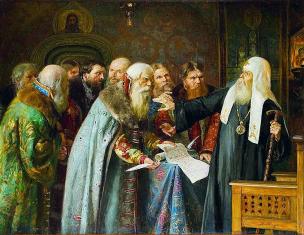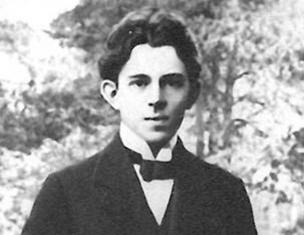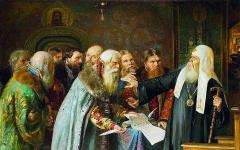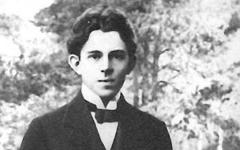
Key dates of life and work
1895 , September 21 (October 3) - born in the village of Konstantinovo, Kuzminsky volost, Ryazan district.
March- arrives in Petrograd, meets A. A. Blok at his apartment, reads his poems, receives letters of recommendation to S. M. Gorodetsky and M. P. Murashev. A. A. Blok inscribes Yesenin’s book of his poems. Reads his poems to S. M. Gorodetsky. Receives from him letters of recommendation to the editor-publisher of the “Monthly Magazine” V. S. Mirolyubov and the secretary of the magazine “Dushevnoe Slovo” S. F. Librovich.
September– writes his first autobiography “Sergei Yesenin”. Participates together with N. A. Klyuev, A. M. Remizov, S. M. Gorodetsky in the “Beauty” evening in the concert hall of the Tenishevsky School (St. Petersburg).
november– visits A. A. Akhmatova and N. S. Gumilyov in Tsarskoe Selo (Malaya St., 63). Akhmatova inscribes Yesenin’s magazine reprint of the poem “By the Sea itself,” Gumilyov inscribes the collection “Alien Sky.”
winter 1915–1916 – visits I.E. Repin on his estate Penaty, reads poetry. Meets the artist Yu. P. Annenkov.
April- to be called to military service Yesenin was issued a certificate of enrollment in the Tsarskoe Selo field military hospital train No. 143. He reads poetry at the “Evening of Contemporary Poetry and Music” in the concert hall of the Tenishevsky School together with A. A. Akhmatova, A. A. Blok, G. V. Ivanov, N. A. Klyuev and others.
July- reads “In the crimson glow, the sunset is effervescent and foamy. " and "Rus" at a concert for wounded soldiers, organized in Tsarskoe Selo hospital No. 17, in the presence of Empress Alexandra Feodorovna and her daughters.
He is preparing the book “Dove” for publication (published in 1918).
May- in the newspaper “Delo Naroda” - the poem “Comrade”.
July- the first collection “Scythians” is published, which published “Martha the Posadnitsa” and poems under the general title “Dove”: “Autumn” (“Quiet in the juniper thicket along the cliff.”), “The road was thinking about the red evening. ", "Blue sky, colored arc. ", "About merry comrades. "
February– in “Banner of Labor” - the poem “The Advent” with a dedication to Andrei Bely.
May– the publishing house “Revolutionary Socialism” (Pg.) publishes the book “Dove”.
August– the newspaper “Izvestia of the Ryazan Provincial Council of Workers’ and Peasants’ Deputies” publishes “The Jordanian Dove.”
December– the publishing house MTAHS publishes a book of poems “Rural Book of Hours”. Unanimously elected to the Moscow Trade Union of Writers.
Writes the poem “Heavenly Drummer”.
February– the newspaper “Soviet Country” publishes “Song of the Dog” and “I’m Tired of Living in native land. " The same issue contains the “Declaration” of the Imagists and a message about the organization of the cooperative publishing house “Imagists”, among the organizers of which Yesenin is named. It is reported that this publishing house is preparing to publish the poet’s books “Poems” (not published) and “The Keys of Mary” (published by the MTAHS publishing house). The newspaper carries an advertisement from the publishing house “Imaginists” that the collective collections “Imaginists” and “Melting House of Words” are being published.
"Soviet Country" publishes the poem "Pantocrator" with a dedication to Rurik Ivnev.
July– participates in the evening “4 Elephants of Imagism” at the stage-canteen of the All-Russian Union of Poets. The Kiev magazine “Red Officer” No. 3 prints a fragment of the poem “Heavenly Drummer”.
november– the book “The Keys of Mary” is published with a dedication to A. B. Mariengof.
December– a collective collection of imagists “Cavalry of Storms” [No. 1] is published with the poem “Heavenly Drummer” dedicated to L. N. Stark.
July–September- makes a trip to the Caucasus.
December – the publishing house “Imaginists” publishes the book “Radunitsa”.
February– the book “Treryadnitsa” is published by the publishing house “Imaginists”. In the collective collection of imagists “Starry Bull” - “Song of Bread”.
April–June– trip to Turkestan.
July– reads “Pugacheva” on literary evening at the House of Printing.
October– meeting Isadora Duncan, who came to Russia at the invitation of the Soviet government.
December– the Petrograd publishing house “Elsevier” is publishing the poem “Pugachev” as a separate edition.
May- end of the year - together with A. Duncan goes on tour abroad. In Germany he meets with M. Gorky and gives him his book “Pugachev” (M.: Imaginists, 1922). France, America.
June– the book “Poems of a Brawler” is published in Berlin.
August– return from a foreign tour to Moscow. Reads an early version of the poem “The Black Man” to friends and acquaintances.
September– writes “A blue fire started to sweep. " and "You are as simple as everyone else. " - the first poems of the cycle “The Love of a Hooligan,” dedicated to A. L. Miklashevskaya.
March – April- writes the poem “Letter to Mother”.
April – May– “Krasnaya Nov” publishes “Young years with forgotten glory. " and "Letter to Mother".
June– travels repeatedly with Leningrad imagist poets, V. A. Rozhdestvensky, Ivan Pribludny to Detskoe Selo, where he performs reading poetry in a sanatorium scientific workers and in the Military Chamber of the Fedorovsky town.
July- performs reading poetry in Sestroretsk at an evening in the Kursaal, organized by the Leningrad branch of the All-Russian Writers' Union. The book “Moscow Tavern” is published in Leningrad. August - Pravda publishes a “Letter to the Editor” by Yesenin and I.V. Gruzinov about the dissolution of the group of imagists.
September– end of the year – trip to the Caucasus. Present at the literary evening-debate “The Trial of the Futurists”, held at the Batumi Theater. The book “Soviet Rus'” is published in Baku. (See the memoirs of literary critic V.A. Manuylov about Yesenin’s stay in Baku on the website “Life and Work of V.A. Manuylov”)
March, 1st – return to Moscow. The magazine "Town and Country" prints lines 1-123 of the poem "My Way". Reads “Anna Snegina” and poems from the cycle “ Persian motifs"at the meeting literary group"Pass" in the Herzen House.
May- The book “Birch Calico” is published in Gosizdat.
June– signs an agreement with the State Publishing House for the publication of “Collected Poems” in three volumes. October – receives a membership card of the All-Russian Writers Union.
December, 24–27 – lives in Leningrad at the Angleterre Hotel. Meets with N. A. Klyuev, G. F. Ustinov, Ivan Pribludny, V. I. Erlikh, I. I. Sadofyev, N. N. Nikitin and other writers.
on the night of 27 to 28 - the tragic death of Sergei Aleksandrovich Yesenin.
Meetings with Yesenin
Located at: Moscow, Rozhdestvenka, no. 4. (return)
The idea for the poem arose from Yesenin during his foreign trip in 1922–1923. Yesenin mentioned the influence of Pushkin’s “little tragedy” “Mozart and Salieri” on the poem. The author read “The Black Man” in the fall of 1923, shortly after returning to his homeland. In November 1925, Yesenin revised the poem. Those who heard the poem in his reading noted that the published text was shorter and less tragic than the one that Yesenin had read before. (go back)
Chronological table
1904- Yesenin is sent to study at the Konstantinovsky Zemstvo School, and then to the church-teachers school in the city of Spas-Klepiki.
1912- Yesenin moved to Moscow.
Autumn 1913- meeting Anna Romanovna Izryadnova.
1914- the first publication of poems in the newspaper “Nov” and the magazines “Parus”, “Zarya”.
In the spring of 1915- Yesenin moves to Petrograd, where he meets N.A. Klyuev, Z.N. Gippius, D.S. Merezhkovsky, A.A. Blok.
1916- first collection of poems “Radunitsa”
1916- Yesenin is drafted into the army.
In the spring of 1917- meeting Zinaida Reich.
1918- Yesenin’s second book of poems “Dove” is published in Petrograd, then “Transfiguration”.
1919- Yesenin turns out to be one of the organizers and leaders of a new literary group - the Imagists.
1920- meeting Nadezhda Volpin.
1920- poems “Departing Rus'”, “Song of the Great March”, “Soviet Rus'”, “Anna Snegina”, “Black Man”; dramatic poems "Pugachev" and "Country of Scoundrels".
1920- a collection of poems “Moscow Tavern” is published.
1922- Yesenin and Duncan got married.
1922-1923- Yesenin and Isadora make a long trip around Western Europe and the USA.
1923- they separated.
1924 - 1925- Yesenin travels through Transcaucasia. At the same time, the collection “Persian Motifs”, the poems “Departing Rus'”, “Letter to a Woman”, “Letter to a Mother”, “Stanzas” were published.
1925- meeting Sofia Tolstoy.
February 27, 1925- Yesenin writes his last poem “Goodbye, my friend, goodbye...”.
February 28, 1925- in the Angleterre hotel, Sergei Yesenin was killed by the special services, staging a suicide.
Zinaida Reich
In the spring of 1917, in the editorial office of one of the newspapers, he met the secretary-typist Zinaida Nikolaevna Reich, his same age. In the history of the Soviet theater she is mentioned as an actress, but at the time they met, such an actress did not exist - Reich played her first role only at the age of 30. Three months after they met, the wedding took place - while passing through, in Vologda. Sergei did not live with her permanently, although she gave birth to two children from him - Tatyana (1918) and Konstantin (1920).
In 1918, Yesenin returned to Moscow again and, after a short friendship with the poets of Proletkult, joined the Imagists. Together with Mariengof, they acquired a bookstore on Bolshaya Nikitskaya, and then the Pegasus Stall on Tverskaya. Mariengof in “A Novel Without Lies” mentioned Zinaida Reich: “Yesenin’s wife, Zinaida Nikolaevna Reich, came from Orel. She brought her daughter with her: she had to show her to her father. Tanya was not yet a year old then. And our bosom friend Mikhail showed up from Penza Molabukh... And in addition - Tanyushka, as they wrote in the old books, “was a living little thing, did not leave her nanny’s lap - to Zinaida Nikolaevna, from her - to Molabukh, from that - to me.” “She didn’t recognize the living chair as anything. And they resorted to cunning, and flattery, and bribery, and severity - all in vain.”
And then, as Mariengof said, Yesenin asked a friend to help him send Zinaida back to Orel. “... I can’t live with Zinaida... I told her that she doesn’t want to understand... She won’t leave, that’s all... she won’t leave for anything... I got it into my head: “You love me, Sergun, I know this and I don’t want to know anything else..." Tell her, Tolya, that I have another woman." Tolya said as Yesenin ordered, and Zinaida Reich and her daughter left for Oryol. And Mariengof also talked about how Yesenin “met” the son whom Zinaida Reich bore to him. "I forgot to tell you. By chance, on the platform of the Rostov station, I ran into Zinaida Nikolaevna Reich. She was traveling to Kislovodsk. In the winter, Zinaida Nikolaevna gave birth to a boy. Yesenin asked on the phone: “What to call?” Yesenin thought and thought, choosing a non-literary name, and said : “Konstantin.” After the baptism, he realized: “Damn it, Balmont’s name is Konstantin. He didn’t go to see his son.” Having noticed me on the Rostov platform, talking with Reich, Yesenin made a semicircle on his heels and, jumping on the rail, walked away. reverse side... Zinaida Nikolaevna asked: “Tell Seryozha that I’m going with Kostya. He hasn’t seen him. Let him come in and take a look. If he doesn’t want to meet with me, I can leave the compartment.” Yesenin nevertheless went into the compartment to look at his son. Looking at the boy, he said that he was black, and Yesenins are not black." Later, someone also recalled that Z. Reich, already living with Meyerhold, demanded money from Yesenin for their daughter’s education.
Sergei Alexandrovich Yesenin (September 21 (October 3) 1895, village of Konstantinovo Ryazan province- December 28, 1925, Leningrad) - Russian poet, one of the most popular and famous poets XX century.
Born in the village of Konstantinovo, Ryazan province, into a merchant family, father - Alexander Nikitich Yesenin (1873-1931), mother Tatyana Fedorovna. In 1904, Yesenin went to the Konstantinovsky Zemstvo School, then began his studies at a closed church-teachers school.
In 1912 Yesenin arrived in Moscow, starting his activities in a bookstore. Gradually he moved to the printing house of I. D. Sytin.
Then in 1913 he entered the Faculty of History and Philosophy of the Moscow City People's University. Shanyavsky. A year later, Yesenin had a son, Yuri, from Anna Romanovna Izryadnova (the marriage was not registered). Yuri was shot in 1937.
In 1914 children's magazine"Mirok" published Yesenin's poems for the first time. In 1915, Yesenin came from Moscow to Petrograd, read his poems to Blok and other poets, became close to the group of “new peasant poets,” published his first collections and gained significant fame.
In 1917-1921 Yesenin was married to actress Z. N. Reich, later the wife of V. E. Meyerhold. From this marriage were born a daughter, Tatyana, and a son, Konstantin, who later became a football journalist.
Yesenin's active participation in the Moscow group of imagists dates back to 1918 - early 1920s.
In the workshop of G. B. Yakulov, Yesenin met the dancer Isadora Duncan, with whom they soon married. After the wedding, Yesenin and Duncan left for Europe. The Izvestia newspaper published Yesenin’s notes about America.
In 1921, from May to June 3, the poet stayed in Tashkent with his friend and poet Alexander Shiryaevets. Despite the fact that the visit was informal, the EU
Enin spoke to the public several times, read poetry at poetry evenings and in the houses of his Tashkent friends. According to eyewitnesses, Yesenin loved to visit the old city, teahouses in the Shaykhantakhur district and Urda, listen to Uzbek poetry, music and songs, and visit the picturesque surroundings of Tashkent with his friends. He made a short trip to Samarkand.
In 1924-1925 Yesenin lived in the village of Mardakan (a suburb of Baku) in Azerbaijan. Currently, his house-museum and memorial plaque are located here.
In 1924, Sergei Yesenin decided to break with imagism due to disagreements with A. B. Mariengof.
On December 28, 1925, Yesenin was found hanging from a steam heating pipe in the Leningrad Angleterre Hotel. His last poem was written in this hotel, in blood: “Goodbye, my friend, goodbye...”
According to the most common version (accepted by all contemporaries of the event), in a state of depression (a month after treatment in a psychoneurological hospital), he committed suicide (hanged himself).
In the 1970s (mainly in nationalist circles) versions also arose about the murder of the poet followed by the staging of his suicide: motivated by jealousy, selfish motives, murder by OGPU officers.
The presented material is a collection of important dates in Yesenin’s biography. Convenient both for academic research and for replenishing personal knowledge, Yesenin’s biography in the table will become an indispensable assistant for every lover of Russian poetry. Childhood, formation and development of the poet, recent years life - Yesenin’s entire life and work are described here. Briefly, perhaps everyone is familiar with the fate of this classic: his poems have not left indifferent several generations of readers. Now a complete and meaningful chronological table of Yesenin is available for study on our website.
1904 - Yesenin is sent to study at the Konstantinovsky Zemstvo School, and then to the church-teachers school in the city of Spas-Klepiki.
1912 – Yesenin moved to Moscow.
1913, autumn– Meeting Anna Romanovna Izryadnova.
1914 – First publication of poems in the newspaper “Nov” and the magazines “Parus”, “Zarya”.
1915, spring– Yesenin moves to Petrograd, where he meets N.A. Klyuev, Z.N. Gippius, D.S. Merezhkovsky, A.A. Block.
1916 – The first collection of poems “Radunitsa”.
1916 – Yesenin is drafted into the army.
1917, spring– Meet Zinaida Reich.
1918 – The second book of Yesenin’s poems “Dove” is published in Petrograd, then “Transfiguration”.
1919 – Yesenin turns out to be one of the organizers and leaders of a new literary group - the Imagists.
1920 – Meet Nadezhda Volpin.
1920 – Poems “Departing Rus'”, “Song of the Great March”, “Soviet Rus'”, “Anna Snegina”, “Black Man”; dramatic poems "Pugachev" and "Country of Scoundrels".
1920 – A collection of poems “Moscow Tavern” is being published.
1922 – Yesenin and Duncan got married.
1922-1923 – Yesenin and Isadora are making a long trip around Western Europe and the USA.
1923 - They separated.
1924-1925 – Yesenin travels through Transcaucasia;
The collection “Persian Motifs”, the poems “Departing Rus'”, “Letter to a Woman”, “Letter to a Mother”, “Stanzas” are published.
1925 – Meeting Sofia Tolstoy.
1925, February 27– Yesenin writes his last poem “Goodbye, my friend, goodbye...”.
1925, February 28- in the Angleterre hotel, Sergei Yesenin was killed by the special services, staging a suicide.
March's most popular resources for your classroom.
Chronological table of Yesenin's life and work outlined in this article.
Chronological table of Sergei Yesenin
Sergei Alexandrovich Yesenin- Russian poet, representative of new peasant poetry and lyrics, and in a later period of creativity - imagism.
Sergei Yesenin was born in the village of Konstantinovo (Ryazan province). |
|
Yesenin went to the Konstantinovsky Zemstvo School, then began his studies at a closed church-teachers school. |
|
left home, then arrived in Moscow, worked in a butcher shop, and then in the printing house of I. D. Sytin. |
|
He wrote a collection of poems, “Sick Thoughts.” |
|
Sergei meets Anna Romanovna Izryadnova. |
|
Yesenin's son Yuri is born. In 1914, his poems were first published in the children's magazine Mirok. |
|
He goes to Petrograd, where he meets such personalities as: Blok, Gorodetsky, Klyuev. |
|
Beginning 1916 | Publishes his first collection of poems “Radunitsa”. |
April 1916 | Sergei Yesenin is drafted into the army. In the army he serves on an ambulance train. |
In Petrograd, Yesenin published his second collection of poems “Dove”, the book “Transfiguration”, and the poem “Ionia”. |
|
Sergei Yesenin becomes one of the creators of Russian imagism. |
|
He writes the dramatic poem “Pugachev”, the poems “Song of the Great March”, “Anna Snegina”, “Departing Rus'” and “Soviet Rus'”. A collection of poems “Moscow Tavern” is being published. |
|
Yesenin meets his future wife Isadora Duncan. |
|
Yesenin makes a long trip around Western Europe (visits Berlin, France) and the USA. Upon his return, Yesenin marries Isadora Duncan. |
|
The marriage broke up. |
|
Traveling through Transcaucasia. He writes poems “Letter to a Mother”, “Letter to a Woman”, publishes the collection “Persian Motifs”. |
|
| Yesenin manages to write his last piece“Goodbye, my friend, goodbye...” | |
According to the official version, Sergei Yesenin committed suicide at the Angleterre Hotel; according to the unofficial version, he was killed by the special services. |








